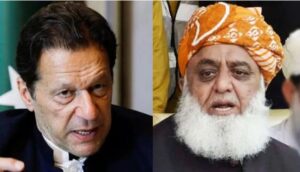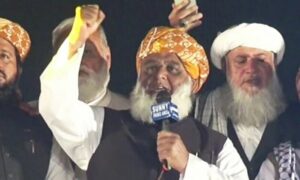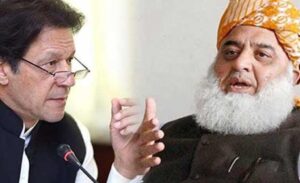A crucial message from former Prime Minister Imran Khan has been conveyed to Jamiat Ulema-e-Islam (JUI-F) chief Maulana Fazlur Rehman. The content of the message remains undisclosed, but political analysts speculate it could be related to Pakistan’s ongoing political situation and potential dialogue between opposition leaders. Sources suggest the message was delivered through mutual contact, highlighting the significance of political engagement in Pakistan’s evolving landscape.
Given their history of political rivalry, this development has sparked curiosity among political circles and the public. Imran Khan and Fazlur Rehman have often been on opposite sides of Pakistan’s political spectrum, with past confrontations intensifying during significant protests and elections. However, the current political climate may require strategic alliances and reconciliations.
Observers believe this exchange could indicate a shift in political strategy, though neither leader has officially commented. Whether this message leads to further dialogue or remains a symbolic gesture is yet to be seen.
Introduction to Imran Khan’s Message for Fazlur Rehman Delivered
The political landscape of Pakistan has been marked by significant rivalries, with prominent leaders often clashing on ideologies, political strategies, and visions for the country’s future. One such rivalry has been between Imran Khan, the chairman of the Pakistan Tehreek-e-Insaf (PTI), and Fazlur Rehman, the leader of the Jamiat Ulema-e-Islam (JUI-F).

Their differences have often sparked debates and political discourse. Imran Khan’s messages and statements directed at Fazlur Rehman have been frequent and, at times, intense. This paper will delve into the details of Imran Khan’s message for Fazlur Rehman, exploring its significance, context, and underlying political meanings.
Background of Imran Khan and Fazlur Rehman
Before analyzing Imran Khan’s message for Fazlur Rehman, it is essential to understand the political backgrounds of both leaders. This section will explore:
- Imran Khan’s Political Journey: The rise of Imran Khan from a cricketing legend to the leader of PTI. Discuss his key political ideals, his journey to becoming the Prime Minister of Pakistan, and his party’s stance on corruption, governance, and social issues.
- Fazlur Rehman’s Political Career: Highlight Fazlur Rehman’s history as the head of JUI-F, his role in shaping religious politics in Pakistan, and his longstanding rivalry with Imran Khan. Discuss his party’s influence in Khyber Pakhtunkhwa and Balochistan and its position on national issues.
The Political Rivalry between Imran Khan and Fazlur Rehman
The political rivalry between Imran Khan and Fazlur Rehman is a central theme in Pakistan’s political discourse. In this section, you will:
- The Role of Ideology: Explain how ideological differences between the two leaders have shaped their rivalry. Imran Khan’s vision for a “Naya Pakistan” focused on anti-corruption, meritocracy, and social justice often clashed with Fazlur Rehman’s more traditionalist and conservative views.
- Key Political Events: Discuss key moments that have shaped their interactions. For example, the 2018 elections, the 2019 Azadi March led by Fazlur Rehman against Imran Khan’s government, and their opposing stances on various political issues.
- Personal and Political Disputes: This section will touch upon personal attacks and political conflicts, including Imran Khan’s criticism of Fazlur Rehman’s religious politics and Fazlur Rehman’s portrayal of Imran Khan as a puppet of the military establishment.
Imran Khan’s Leadership and Communication Style

Imran Khan is known for his strong communication style, which is often direct and assertive. This section will explore:
- Khan’s Use of Public Statements: Imran Khan tends to communicate his views through public addresses, social media, and interviews. His messages to political opponents, including Fazlur Rehman, are often made publicly to address both his supporters and critics.
- Imran Khan’s Rhetoric: A deep dive into the rhetoric Imran Khan uses in his political discourse. Analyze his tone, choice of words, and the impact of his speeches on public perception.
- Strategic Messaging: Discuss the strategic importance of Khan’s public messages. How does he use messages directed at Fazlur Rehman to further his political goals and engage his supporters?
The Context Behind Imran Khan’s Message for Fazlur Rehman
Imran Khan’s message to Fazlur Rehman often comes in response to specific political developments. This section will examine:
- Political Events Triggering Messages: Investigate the events that prompted Imran Khan to deliver messages to Fazlur Rehman, such as the Azadi March, opposition alliances, and accusations of corruption or mismanagement.
- Government Responses to Opposition: Discuss how Imran Khan’s government responded to Fazlur Rehman’s accusations, especially during protests or opposition movements. What role does Imran Khan’s message play in defending his government’s policies?
- National and International Context: Consider the national and international context in which these messages are delivered. How do global and domestic political dynamics influence Khan’s statements toward Fazlur Rehman?
Imran Khan’s Critique of Fazlur Rehman’s Political Agenda
Imran Khan has frequently criticized Fazlur Rehman’s political agenda, especially concerning religious conservatism and his role in the opposition. In this section:
- Criticism of Religious Politics: Analyze how Imran Khan critiques Fazlur Rehman’s reliance on religious politics and the way JUI-F uses religious rhetoric to gain political support.
- Governance vs. Opposition: Discuss how Imran Khan positions himself as a champion of good governance in contrast to Fazlur Rehman’s opposition stance. This can be connected to the broader political narrative of corruption, economic issues, and governance failure.
- Imran Khan’s Claims of Deceptive Politics: Detail Imran Khan’s accusations that Fazlur Rehman and other political leaders, especially those in the opposition, are involved in corrupt practices and have failed to deliver on promises. How does Khan’s message reflect his government’s positioning?
Fazlur Rehman’s Reactions to Imran Khan’s Messages

Fazlur Rehman has often responded directly to Imran Khan’s critiques, and his responses provide insights into the ongoing political war of words. This section will:
- Fazlur Rehman’s Counter-Narrative: Analyze Fazlur Re’s rebuttals, his own critique of Khan’s leadership, and the political rhetoric he employs.
- Religious and Ideological Arguments: Discuss how Rehman defends his position on religious politics, governance, and the role of the military in Pakistan’s political sphere. How does he respond to Imran Khan’s accusations of corruption and inefficiency?
- Public Perception: Explore how Rehman’s responses shape public perceptions of both leaders. Does his counter-criticism resonate with the public, or does it backfire?
The Impact of Imran Khan’s Message on Pakistan’s Political Landscape
The messages delivered by Imran Khan to Fazlur Rehman had a profound impact on Pakistan’s political environment. This section will:
- Polarization of Political Parties: Examine how Imran Khan’s messages contribute to the further polarization between PTI and the opposition parties, particularly JUI-F.
- Shaping Public Opinion: Discuss how Khan’s rhetoric and messages help him shape public opinion, especially among PTI supporters. Does his narrative of “anti-corruption” resonate with the broader population?
- Strategic Shifts in Opposition Politics: Investigate how Fazlur Rehman and his allies have adapted their strategies in response to Khan’s messaging. How does it impact the opposition’s unity and approach to political engagement?
Imran Khan’s Message in the Context of the Broader Opposition Movement
Fazlur Rehman has often been at the center of opposition movements against Imran Khan’s government, such as the Azadi March and the Long March of 2019. This section will explore:
- Opposition Alliances: Analyze how Imran Khan’s message to Fazlur Rehman fits within the broader political rivalry between the government and opposition parties.
- The Role of Other Political Figures: Discuss the role of other opposition leaders, such as Shehbaz Sharif, Bilawal Bhutto Zardari, and Asif Ali Zardari, in the ongoing political battle. How does Imran Khan’s message to Rehman impact these dynamics?
- National Governance vs. Political Mobilization: How does Imran Khan’s government balance the need for governance with the ongoing political mobilization of opposition forces? This can include discussions of the PTI’s political strategy, legislative agenda, and public image.
Frequestions Asked Questions
What was Imran Khan’s message to Fazlur Rehman?
The exact content remains undisclosed, but it likely pertains to Pakistan’s political landscape.
How was the message delivered?
Reports suggest it was conveyed through a mutual contact.
Why did Imran Khan send this message?
It could be an attempt to open political dialogue amid current tensions.
Has Fazlur Rehman responded to the message?
No official response has been made public yet.
Is this a sign of political reconciliation?
It’s uncertain, but analysts believe it could indicate a strategic shift.
What are their political differences?
Imran Khan and Fazlur Rehman have historically been rivals with opposing political ideologies.
Could this message lead to a political alliance?
While unlikely, evolving political dynamics could create unexpected developments.
Has something similar happened before?
Previous political tensions have occasionally led to indirect communication between rivals.
How are the public and analysts reacting?
The message has sparked speculation about possible behind-the-scenes negotiations.
What’s next after this message?
It remains to be seen if further dialogue or political actions follow.
Conclusion
The delivery of Imran Khan’s message to Fazlur Rehman has added a new twist to Pakistan’s political discourse. While its contents remain unknown, the move suggests potential shifts in political strategies or attempts at dialogue. Given their history of rivalry, this communication has generated significant speculation. Analysts believe it could either be a step toward negotiation or a calculated political maneuver. With no official statements from either leader, the implications of this message remain uncertain.

